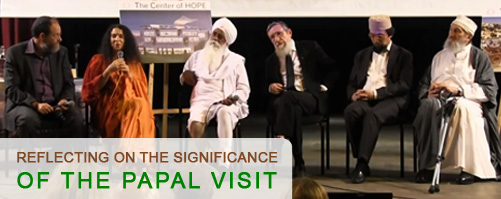
Reflecting on the Significance of the Papal Visit

Elijah held an event on the evening of the Pope’s departure to reflect on the significance of the pilgrimage here and to consider what impact it might have had.
The evening event, held at the YMCA, was recorded and excerpts are made available on this page.
Alon Goshen-Gottstein moderated the discussion and began by asking Rabbi Daniel Sperber, who is a Rabbi from the Old City of Jerusalem and a friend of Elijah’s work, about the resistance of some Jewish groups to the visit of the Pope. The Rabbi emphasised the importance of educational work to counter negative attitudes based on ignorance. He drew distinctions between the ultra-Orthodox segments who live in the Old City, who have become radicalised on a range of issues, and Jews in other places. Rabbi Sperber also emphasised that this visit was part of a process of reconciliation between Jews and Christians and that processes of this magnitude take time and are achieved through small, sometimes symbolic, steps.
We were joined on the phone by Rabbi Avraham Skorka, the Pope’s Rabbi, who had hoped to be present in person but was caught up by delays in the Pope’s itinerary. Rabbi Skorka said that it was too early to evaluate the significance of the pilgrimage – which he was still on. He did believe that many important symbolic acts had been accomplished. He was disappointed that the visit was not free from politics but acknowledged that it was unlikely that a visit to this part of the world could avoid such an encroachment. For him, the moments with the Pope at the Kotel brought with them a flood of emotions, including remembrance of those members of his family who perished in the Holocaust and thus did not have the opportunity to make such a pilgrimage.
He, like others, felt that the Pope’s speech at Yad Vashem (the Holocaust memorial in Jerusalem) was a great contribution to all of humanity. The Pope asked, “Adam (Man), where are you?” paraphrasing God’s call to the first man in the first book of the Bible. “Who corrupted you, who disfigured you, who led you to believe you are the master of good and evil? Not only did you torture your brothers and sisters but you sacrificed them to yourself, because you made yourself a God.” “Once again in this place we hear this voice of God. Adam, where are you?”
The next participant to join the forum was Shaykh Abd al-Wahid Pallavicini, who had joined the Pope from Milan. The Shaykh explained a little about the relationship of Islam to other religions and also emphasised the importance of education to overcome prejudice. His son, Imam Yihya, who is himself a leader of the Muslim community, joined him on stage and said that he believed that the sacred sites of each of the religious traditions should be sacred to all. He urged religious leaders to see how we can share religious sites and make all feel welcome everywhere. For him, the significance of the visit was that it was genuinely an interreligious pilgrimage. This was the new sign of hope.
When Bhai Sahib joined the group on the stage, Alon asked him why he was there. His answer was greatly appreciated by the gathering – Jerusalem is sacred for so many people. Its sanctity is in and from the people who are nurtured by the city. A place sacred for other people is sacred for Sikhs, too. Bhai Sahib also hoped that his presence would expand the circle of sanctity and give additional meaning to the pilgrimage of the Pope. Sadhvi Bhagavati Saraswati was the final speaker. She felt that the Pope’s pilgrimage had been meaningful. Although it may not have immediately yielded all the hoped-for outcomes, it was a step in an important process. Jerusalem needs healing and this was a moment of healing. We too often forget that the unhappiness or destructive attitudes or behaviours of one part humanity affects us all. Focusing only on what our own community’s needs are will not achieve the outcome we want because our destinies are bound together. The Pope provided a common focus and a beacon of hope.
Return to Newsletter
The Elijah Interfaith Institute relies on the support of friends in order to conduct its ongoing activities:
Phone: +972-2-672-9276 , Skype: adminelijah
P.O.B. 4069
Chopin St.
91040 Jerusalem
Israel
The Elijah Interfaith Institute is a 501© (3) organization. All donations are US tax-exempt.
If you do not wish to receive our newsletter, click here to unsubscribe